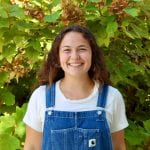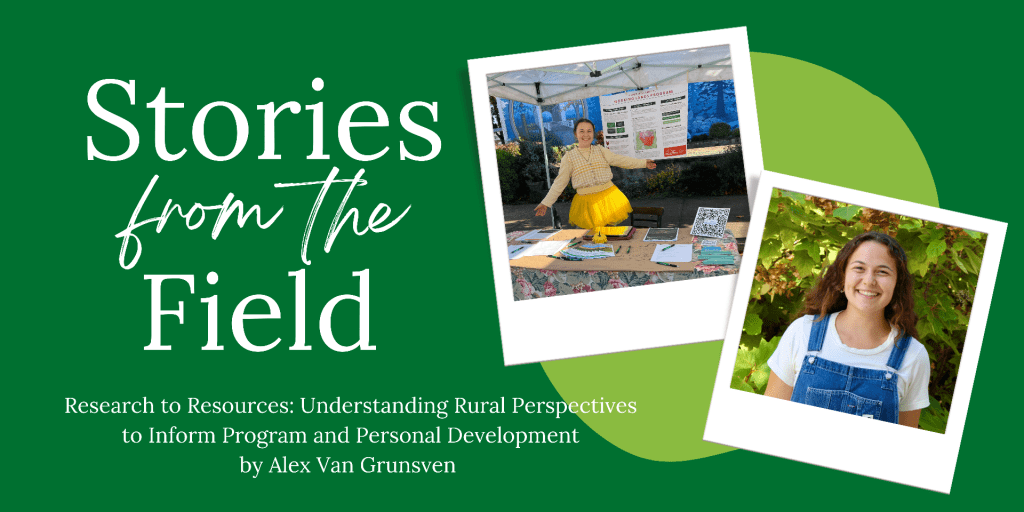by Alex Van Grunsven, Working Lands Program Developer, Coast Fork Willamette Watershed Council
Committing to serve in a rural community could not be more rewarding. Imagine meeting individuals who have lived on a single property for 30 plus years. They tell stories of the animals who frequent their woods, the water that meanders across property lines, the shift in cover crops that populate their pasturelands and, most importantly, the deepening of their connection to their environmental and local communities. These stories, in my eyes, are the reasons why opening your ears and heart to those around you helps to shape not only your understanding of a rural community, but also your entire being for the better.
Going on my second year serving in rural regions, I’ve talked with numerous people about the barriers and gaps community members face regarding their connection to food and farming. My current term as Working Lands Program Developer for the Coast Fork Willamette Watershed Council in Cottage Grove, Oregon has brought me a new perspective on how rural producers and consumers interact with their local food systems. I couldn’t have ever imagined to have learnt the valuable information I did in these past 4 months without having the opportunity to table at the South Willamette Valley (SVFM) and Lane County Farmers Markets (LCFM).
The general scope of the Working Lands Program (WLP) is to provide a farmer-centered, free service aimed at tackling the barriers farmers, ranchers and foresters face and provide support to transition to more regenerative land management practices (Van Grunsven, Alex “Working Lands Program Farmer’s Market Outreach Report 2022” January 19, 2022.Working Lands Program, Report). Furthermore, the WLP is a brand-new program offering assistance to landowners beginning January 2023. The Working Lands Program relies heavily on the input of community members in the counties of Lane, Linn and Benton to provide context for program development and its evolution over time. That is why the WLP team identified the SVFM and LCFM as prime opportunities to gather community input and accomplish the following:
- Raise community awareness of the Working Lands Program
- Gather impressions of “regenerative agriculture” and associated practices from the public and market vendors
- Gain an understanding of the expressed and perceived regional issues associated with working lands operations
Now the background of why our organization decided to conduct on-the-ground outreach at farmers markets is an important piece to note. However, the how and what following such motives paint a better picture of what impact my position directly has on the local communities I aim to help. On three separate occasions, I stood through rain and shine at each market to welcome community members to engage in conversation, fill out a survey and answer topical questions about their local agricultural systems. I asked consumers at the LCFM to write or draw their response to the question: “What is the number one issue Oregon farmers face today?” Let’s just say – the range of answers written on that poster were vast and highly entertaining to reflect upon. Similarly, consumers at the SVFM were eager to discuss the nuance of farmer impacts on society and were thinking on a deeper level about the survey questions at hand. Back and forth conversations flowed as new understandings helped inform the place-based impressions my fellow community members believed in. Such responses were essential pieces to include in a comprehensive outreach report I wrote outlining community impressions and how they will inform further program development. Which as a little spoiler, the WLP will focus on increasing producer awareness for the term “regenerative agriculture” given the consumer support in the marketing realm and increased government funding for such practices.
Documenting and analyzing the feedback of local peoples was not an easy task. Many community members came from all different backgrounds and ways of life, which posed difficult to apply a one-size-fits-all theme across the collected data. However, it only took one interaction with Tom Murray, SLO Farm Farmer and LCFM Board President, to shape my perspective on rural farming and food systems moving forward. As a farmer himself, Tom understands what it takes to run a farming business in this region. He shared thoughts of how success in agriculture does not come without time, effort and high amounts of sacrifice. What I gained from his insights was a chilling realization that all types of farmers, small scale, large scale, rural and urban alike, suffer from lack of mental health support in their communities. To be a rural farmer, rancher or forester takes a certain type of dedication and grit that superimposes your life with your livelihood. If there is one thing I will take with me from my experience chatting with consumers and vendors at both farmers markets, it is building relationships with your neighboring farmers will not only strengthen local food systems and peoples, but will also shift the very framework rural societies operate on forever.
Thank you to all the rural farmers, ranchers, foresters, and landowners I’ve met for opening my eyes to the beauty and struggles of your livelihoods. I hope I can give you the support and attention you deserve during the rest of my time as a RARE member.
 About the author, Alex Van Grunsven: Originally from the dairy capital of the United States, Wisconsin, Alex made the trek to the Pacific Northwest in 2017 to attend school at the University of Oregon (UO). She pursued a degree in Environmental Science and Food Studies while working with UO affiliated programs such as the First Year Interest Group program, the Urban Farm on campus and Environmental Leadership Program. Her passions lie in creating and maintaining sustainable, accessible and local food systems and agricultural operations across regional communities. Looking at the year ahead, Alex hopes to connect with as many local farmers, ranchers and landowners of the Upper Willamette Valley as possible and is eagerly awaiting any and every opportunity to grow food and spend time in the soil. She also enjoys trying foods from different cultures and exploring the hidden lands of Oregon and beyond.
About the author, Alex Van Grunsven: Originally from the dairy capital of the United States, Wisconsin, Alex made the trek to the Pacific Northwest in 2017 to attend school at the University of Oregon (UO). She pursued a degree in Environmental Science and Food Studies while working with UO affiliated programs such as the First Year Interest Group program, the Urban Farm on campus and Environmental Leadership Program. Her passions lie in creating and maintaining sustainable, accessible and local food systems and agricultural operations across regional communities. Looking at the year ahead, Alex hopes to connect with as many local farmers, ranchers and landowners of the Upper Willamette Valley as possible and is eagerly awaiting any and every opportunity to grow food and spend time in the soil. She also enjoys trying foods from different cultures and exploring the hidden lands of Oregon and beyond.
Interested in gaining food systems experience of your own? Are you looking for a life changing experience in rural Oregon? Learn more about serving with the RARE AmeriCorps Program. Applications for Year 30 (2023-24) due April 30, 2023 by 11:59pm PDT.
